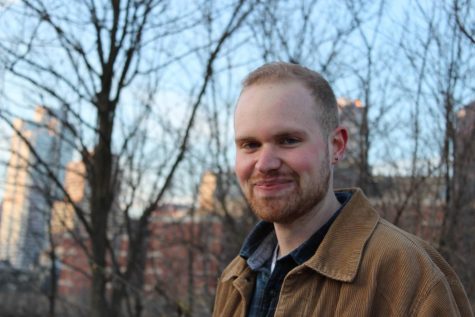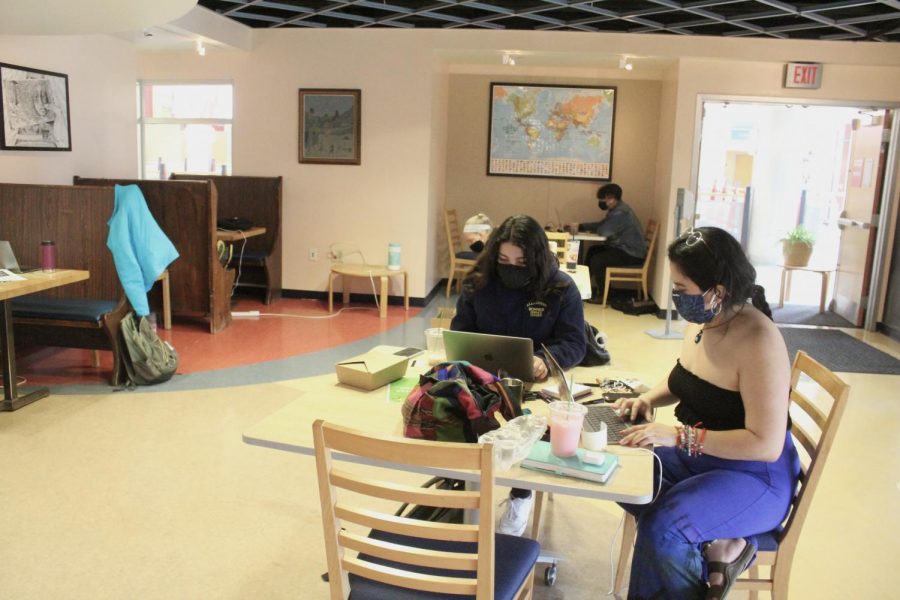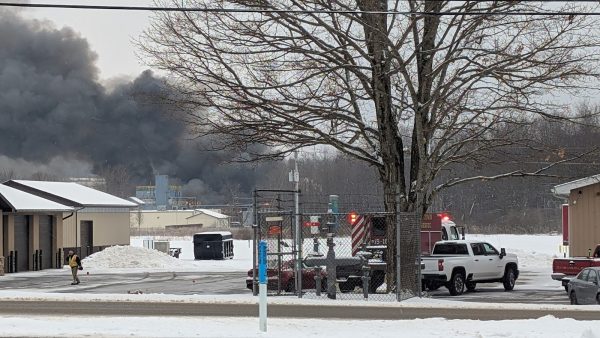‘Unprecedented’: a year like none other
College remains open during pandemic
Alexa Isaguirre Portillo, ’24 (L), and Kyrié Doniz, ’23, study in Grounds for Change, which opened this spring with new COVID-19 guidelines.
Unprecedented. There are few other words to describe the past year, according to Vice President of Student Life and Dean of Students April Thompson.
“We were as surprised as every one of you as how to navigate one day at a time,” Thompson said. “I think back to a year ago when students had to leave campus and they had to leave all of their belongings at spring break and they couldn’t come back. And we certainly, had we known what was ahead, would have done things very differently.”
Students were unable to return until Crawford County entered the yellow phase of COVID-19 restrictions in late May 2020, put into place by Pennsylvania Governor Tom Wolf. Many students were concerned with the college’s initial plan to pack students’ belongings.
“Knowing what we know now, I would have in retrospect, tried to give students and families much more advanced notice about every single thing that happened, because one of the hardest things I think for students and families to deal with was the lack of solid information so that students could plan accordingly,” Thompson said. “I couldn’t give information that I didn’t know, and because the state of Pennsylvania and the CDC kept changing everything all the time, we were sort of at their mercy a lot of the time. The biggest thing I would do differently is to make certain that students and families had advanced information well in advance.”
Provost and Dean of the College Ron Cole, ’87, agreed with Thompson.
“Even if it’s not fully complete information, the flow of information helps to provide some level of direction and alleviates uncertainty,” Cole said. “(We should engage in) tenacious communication (with the campus community).”
The college reopened in late August with health and safety policies put in place by the newly established Allegheny College Health Agency, led by Dr. Gabrielle Morrow, an emergency physician at Meadville Medical Center and Professor of Biology and Global Health Studies and Epidemiologist Dr. Becky Dawson. Requirements included universal mask-wearing, physical distancing, regular testing, as well as committing to a community of mutual care by signing the Gator Pledge. Morrow declined to comment to The Campus and Dawson did not respond to multiple requests for comment.
The first two weeks of classes required students to remain on-campus for a campus quarantine. Some students expressed concern about work or retrieving medicine and food off-campus during the quarantine.
“I have been here the whole summer and I had to quit my job because of the Gator Pledge,” Noah Bebee, ’21, told The Campus in September. “I also took the smallest meal plan with the intent to provide for myself like I have been doing all summer, but now I cannot provide for myself and my job is at a loss without me.”
The administration struggled throughout the fall semester to keep students’ confidence. President Hilary Link received backlash from students when she posted a photo on Instagram of her attending her son’s high school soccer game while students were required to remain on-campus during the quarantine. Hundreds of students commented on the post which was subsequently deleted. At an Allegheny Student Government general assembly on Nov. 22, many students confronted Link about the administration’s transparency with students.
“We’ve been reaching out to you this entire semester, and there’s a lot of events and things that have happened throughout the semester where I feel like the students aren’t being heard,” Haley Lex, ’22, said during the assembly. “You answer certain things and not others … I feel like there’s very selective hearing going on, personally, and I feel like that’s why students are getting frustrated.”
Amya Ruiz, ’21, echoed students’ frustration with the semester and feeling as though the administration was not hearing student concerns.
“Life is freaking very hard right now, and if we have feelings to share to a person in power, who’s dedicated to making our lives easier and who’s been in hiding, and we haven’t been feeling heard, we have the right to say it and we have the right to say it however we want to,” Ruiz said during the assembly.
Link has stated that opening up lines of communication are vital to her strategic realignment plan. The college has hired former head women’s basketball coach Kate Costanzo to serve as college ombudsperson and will be appointing class deans to serve as additional point-people for students.
“We clearly need to close the gaps,” Vice President for Institutional Advancement Matt Stinson told The Campus in February. “With this new model, there are new touchpoints for students.”
Cole indicated additional initiatives that the college was considering prior to the pandemic. He noted that these were implemented quicker as a result of the pandemic. These included the transition from Sakai to Canvas, which was originally slated to take one and a half years to complete. The college transitioned to Canvas during the fall semester.
Among the other measures, Cole explained universal design, which looks at course learning outcomes and centers the course around students and these learning outcomes. Faculty members were also moving to conduct diversity audits of courses, syllabi and content. Cole credited the 75% of faculty members who participated in one or more of the initiatives.
“There was a moment where I wondered, should we still do all that?” Cole said. “We recognized the need to do these things now more than ever. Each one improves the learning experience for the new modalities we needed, such as teaching remotely. We need to understand how courses include all of our students and recognize the limitations for students. … It was an inspiring commitment (from the faculty) despite incredible uncertainty.”
According to the New York Times, there have been more than 660,000 cases of COVID-19 at college campuses throughout the country. In Pennsylvania, there have been more than 33,000 at 116 colleges and universities. According to the Nov. 13 issue of The Campus, the fall semester ended with 33 cases. As of today, there have been 44 cases this semester as indicated by ACHA’s COVID-19 dashboard. Thompson credits the low number of cases to the ACHA and students.
“(We relied upon) really sound scientifically-based medical decisions from the beginning,” Thompson said. “I believe (this) contributed to us opening with very low numbers, keeping our numbers way down, and then opening again in the spring with low numbers. But if it hadn’t been for students and their personal commitments to keep themselves and each other safe, it wouldn’t have mattered what we did at the health agency. So, I put students front and center because I believe our campus community made a decision to be here.”
Despite the college’s success in staying open, Thompson has heard from many students that they are struggling.
“(One of the biggest challenges I’ve heard from students and families) is the loneliness and isolation, whether they were in quarantine or in their rooms, having to wear masks and stay distant and not be able to do the things that are signature Allegheny things, the clubs and organizations, the events, the involvement fair,” Thompson said. “Those are key to the Allegheny experience and our first-year students have not even experienced that at all. … The student experience, I believe was severely compromised by the isolation that came from managing COVID.”
Cole added that students, faculty and staff have endured prolonged stress and trauma throughout the past year.
“That has a compounding effect … (we) can’t ignore that under more ‘normal’ circumstances a small amount of stress around an assignment might be manageable,” Cole said. “Under prolonged trauma and stress, the smallest stressors feel magnified and our ability to cope and manage stressors is far less so.”
Cole said that he has emphasized to faculty members the need to recognize this collective stress and to allow for grace and flexibility with coursework.
The college is planning for a full reopening in the fall with no remote learning. Cole encouraged students to get vaccinated, and said that the more students that get vaccinated, the greater the community can return to a more typical residential college experience. Link indicated that a priority of the fall is rebuilding a sense of community.
“One of the things I’ve spoken with the faculty and the administration and staff about is — and I spoke actually to the ASG new incoming president and vice president about this as well — we have a lot of work to do as a community to rebuild our sense of community, because people are just isolated and we can have great conversations, but it is not the same as looking each other in the eye and seeing one’s body language,” Link said.
Link added that COVID-19 was not the only crisis that occurred this year.
“I think it’s really a mistake to only talk about this year under COVID, because this year was so challenging for many other reasons as well,” Link said. “The Black Lives Matter movement and racial reckoning, the political divide that we went through in November, so many financial concerns of our students and their families and all of the uncertainties surrounding what was going on in the world. So to me, I think this year is a success, even though it came with a lot of sacrifice.”
The college is planning for the fall semester to look significantly more like the typical Allegheny experience, especially for incoming first-year students as well as for rising sophomores.
“One of the things (the Allegheny Bound team) has been talking about is how to deliver not only a welcome week for our first-year students, but also for the campus,” Associate Dean of Students for Wellness Education Gretchen Beck said. “Our rising sophomores, this year, weren’t able to experience that.”
Thompson recognized graduating seniors as a resilient group, especially completing their senior comprehensive projects during the pandemic.
“A big congratulations to our students, particularly our seniors who are graduating in the midst of this,” Thompson said. “They have not had the experience that they expected or any of us hoped for. For our seniors to be comping in the middle of this is a remarkable accomplishment. The creativity that went into completing comps that had to switch on a dime potentially because of COVID — I talked to a number of seniors who have had to do that. So kudos to them.”

Ethan Woodfill is a senior from Pittsburgh, Pennsylvania. He is an Environmental Science & Sustainability and Political Science double major with an...

Sami Mirza is a senior from many different places. He is majoring in International Studies with a focus on the Middle East and North Africa and minor in...










